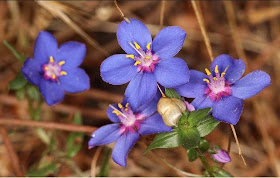Type of Flower
Anagallis:
Anagallis is a genus of about 20–25 species of flowering plants in the family Myrsinaceae, commonly called pimpernel and perhaps best known for the scarlet pimpernel referred to in literature. The botanical name is from the Greek, ana, "again", and agallein, "to delight in", and refers to the opening and closing of the flowers in response to envir onmental conditions.
These are annual or perennial plants, growing in tufts on weedy and uncultivated areas. The stems are prostrate or decumbent. The leaves are opposite, rarely whorled, and sometimes with a few alternate leaves at the end of the stem. They are usually ovate in shape with a cordate base. Some of the species produce flowers of various colors. The flowers are radially symmetrical and have 5 sepals. The corolla consists of a short tube and 5 lobes. The tube may be so short that the lobes appear to be separate petals. They are usually solitary in the leaf axils, but sometimes are on short spikes at the end of the stem. Pimpernel flowers remain open only under direct sun-light. The stamens are opposite the corolla lobes. The staminal filaments have conspicuous hairs. The ovary is superior, globose, and circumscissile near the middle.
Anagallis prefers a well drained soil. When planting in hanging baskets or container take care not to overwater in the early stages.
Anagallis is naturally perennial. If you wish to keep plants over winter, bring the plants indoors as the minimal winter temperature that the plant can survive in is 6 to 8°C. Perfect drainage is a sound precaution against winter loss. Cuttings may also be taken as insurance for overwintering indoors.
Sow indoors in Spring, January to May Fill individual peat pots, seed-starting cells or flats, or 7cm (3”) pot with a good commercial seed-starting mix. Moisten the mix and let it drain. Surface sow the seeds and cover with a thin layer of vermiculite or 1/16 “ of compost. Do not cover with soil as they need light to germinate.
Cover the containers with clear plastic to keep the mix moist while the seeds are germinating and place in a warm location. Keep moist, watering from the base of the container. Germination takes 18 to 21 days at 18-20°C (65-70°F). As soon as seedlings start to emerge, remove the plastic cover and lower the temperature to 15°C (60°F). Germination can sometimes be slow and erratic, don't discard the container too early as a second flush of seedlings may appear later.
When large enough to handle, transplant the seedlings into 7.5cm (3in) pots or trays. Handle the plants with care and avoid disturbing the roots as much as possible when transplanting to prevent wilting. Gradually hardened off for 10-14 days before transplanting into the flowering site after all risk of frost has passed. Plant 23-30cm (9-12in) apart in full sun.
Plant uses Rockeries, Underplanting, Baskets, Bedding, Borders, Containers, Patio.
References:
http://en.wikipedia.org/wiki/Anagallis
http://www.seedaholic.com/anagallis-monellii.html




















No comments:
Post a Comment